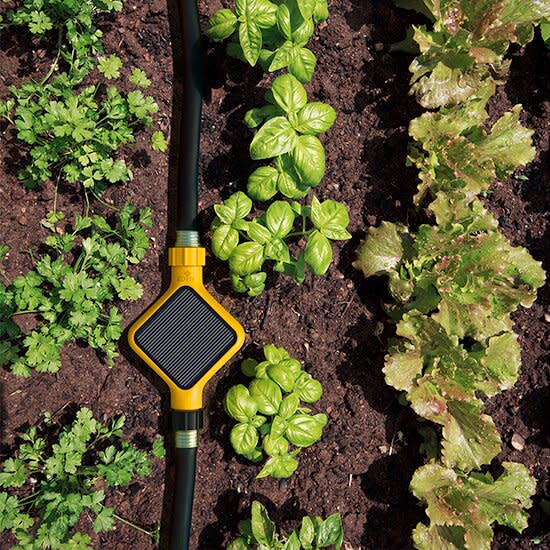This Virtual Green Thumb Will Keep Your Plants Alive

There are few things more depressing than watching your plants wither and die, taking with them your dreams of hosting dinner parties where you humblebrag about your impossibly juicy homegrown tomatoes. In a perfect world, your plants would be able to tell you exactly what they need—which is the idea behind a new product called the Edyn Garden Sensor.
The compact device features a metal stake and a small solar panel, and is capable of measuring things like soil pH, nutrient levels, moisture and sunlight and then feeding that data to an Edyn smartphone app via WiFi. The product allows you to program in which types of plants you're growing from the app's database of 5,000 varieties, and will ping you real-time status updates and advice, suggesting that it might be time to harvest the basil or that your kale could use some more fertilizer (it can even test your soil and suggest which plants will thrive there). Edyn also sells a water valve, which can be connected to an existing sprinkler system and automatically spray plants only when it senses they're getting too dry, conserving water in the process. Edyn's products take almost all the guesswork out of gardening, so it's not hard to see why Edyn's Kickstarter raised more than triple their $100,000 fundraising goal.
The Edyn Garden Sensor was originally developed by Princeton grad and ecologist Jason Aramburu while he was working to help farmers in Africa grow crops in extremely dry conditions. His prototypes drew interest from noted industrial designer Yves Béhar, who is responsible for the Edyn Garden Sensor and Water Valve's sleek packaging and app design. Both Edyn devices are currently available for pre-order (Edyn Garden Sensor, $99.99; Edyn Water Valve, $59.99) and will be sold in Home Depot in Spring 2015. Though the Edyn products are an obvious choice for home gardeners, part of Aramburu's plan is to be able to provide the devices at a very low cost to farmers in the developing world.